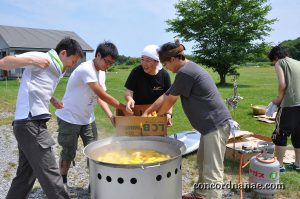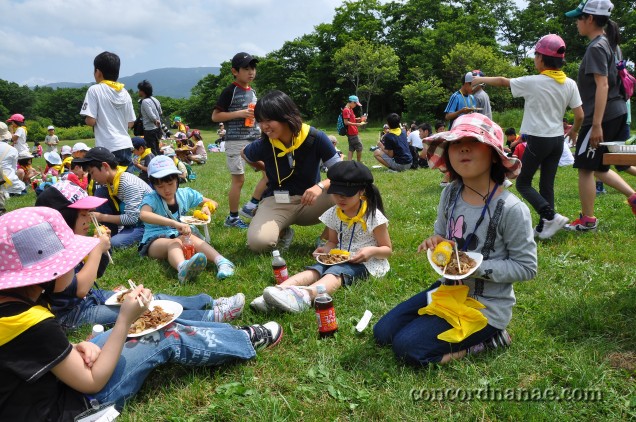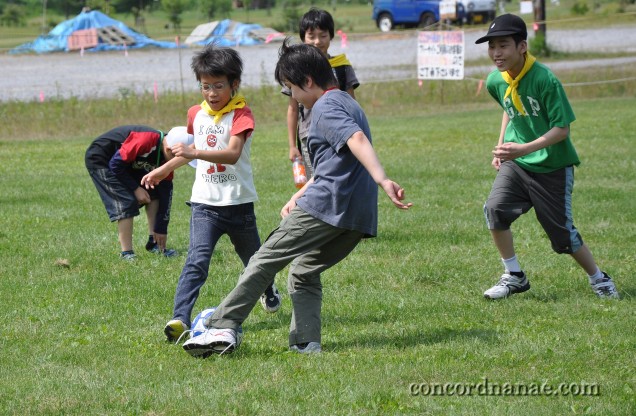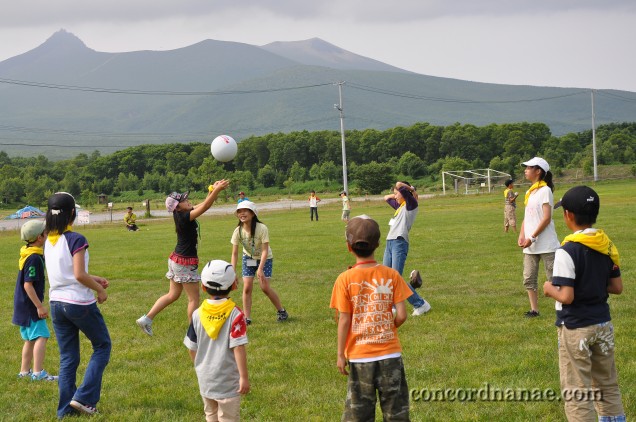
By Ben Mirin, CIR
July 27th, 2011
NANAE ONUMA—On the morning of July 26th, twenty-four of Nanae’s government employees arrived at the town office in outfits that undoubtedly broke Japan’s “casual bizz” dress code for summer. Instead of collared shirts, slacks, and indoor slippers they tramped inside with dusty sneakers, cargo shorts, bandanas, and the occasional apron.
Moments after the morning bell rang I ran outside with this already sweaty entourage and piled into one of several cars bound for Nagareyama Onsen in the neighboring town of Onuma. When we arrived crates of vegetables and packs of ice were already streaming across the spa’s luxurious grounds. An early start was critical; soon, 235 children and parents from Fukushima would arrive for an all-day barbecue to kickoff the first season of Fukushima Kids’ Summer Camp, and to enjoy their first leisurely day outside in over four months.
“You are wonderful hosts!” exclaimed the Camp’s founder Toru Shinshi. “Normally we have about 80 volunteers with us on the program, but today there is a great local turnout.”
Not thirty minutes had passed and already Nanae’s task force was greeting the first waves of students and summer camp staff. As they arrived, so did volunteers from Nanae’s Board of Education and from the Higashi Onuma Elementary student body and Parent-Teacher Association. Groups from all around Nanae would arrive that day to help the Summer Camp achieve its simple, heartfelt goal:
“All we want is for these kids to be able to play outside again, especially during their summer break,” Shinshi-san explained. “Towns throughout Fukushima Prefecture have cancelled all of their student programs for the summer of 2011 because of the accident and unfolding crisis at the [Fukushima Daiichi] nuclear power plant, and children are being forced to stay indoors.”

Formerly a nature guide at a summer camp in Fukushima, Shinshi-san is one of many self-starters in the Prefecture who have implemented their own humanitarian projects. After this year’s nuclear disaster forced his camp to close, he turned his attention to Hokkaido and used contacts in his line of work to organize Fukushima Kids’ Summer Camp in May 2011.
“Excluding Fukushima, it’s possible to host this sort of camp in other regions of Tohoku” Shinshi-san said. “I chose Hokkaido for our location to inspire a gear-change. Hokkaido is a new frontier in Japan, and my hope in bringing families here was to instill the feeling of a fresh start.”

Fukushima Kids’ Summer Camp is scheduled to last until August 28th, for the duration of most elementary and high school summer vacations. Four hundred sixty students and parents signed up in June for different segments of the program, which will travel from Onuma on to Matsumae, Nemuro, Furano, and Wakanai towns.
After serving lunch to the hungry crowd, I put my apron in the car and joined the nearest group of Fukushima children sitting together under a large oak tree. This was how I met Tomie Honda and her son, Takuto.
“We are only staying in Hokkaido for four weeks, and then we will return home” said Honda-san, who lives with her son in Minamisouma-shi, Kashima-ku, a town thirty kilometers from the Fukushima Daiichi plant.
“This program will be a cherished memory for us. Our family loves nature and playing outside, and all we’ve wanted is to be able to play without worry.”

Honda-san has been unable to leave Fukushima for fear of her son’s mental health. Takuto, age 12, is severely autistic. When their family tried to relocate to the city of Kanto, he suffered from constant panic attacks and lost the support he had found at Jidou Day Service, a day care for mentally handicapped children based in Minamisouma-shi.
“Takuto has a very structured life in our hometown,” Honda-san explained. “I only allow my son to play outside for an hour everyday, and he only goes out wearing long clothes. If he wants to play longer I’ll take him for a drive.”
The Honda’s will be back in the danger zone in less than one month, but for now, they are making the most of a rare opportunity to enjoy the outdoors once again. This may not be there last chance, either.
“Fukushima’s radiation problems are taking more time to resolve than we expected,” Shinshi-san said, “so we may continue this program in the coming winter and in the spring of 2012. For as long as possible, we will do our best to provide special outdoor vacations for these kids, who have endured such hardship in recent months.”♦

Links:
Fukushima Kids’ Summer Camp: Official Press Release (English)
FKSC: Blog/Activity Diary (Japanese/English translation available with Google Chrome only)
FKSC: Donate! (Japanese/English; see above)
Please consider leaving a comment on this post in the comment section below, or subscribing to the RSS feed to have future articles delivered to your feed reader.
To submit suggestions for future content, please email concordnanae@gmail.com. Thank you for visiting ConcordNanae.org.

